高一英语下学期期末考试试题牛津译林版 (2)
牛津译林版高中英语必修二高一英语试卷 (2)
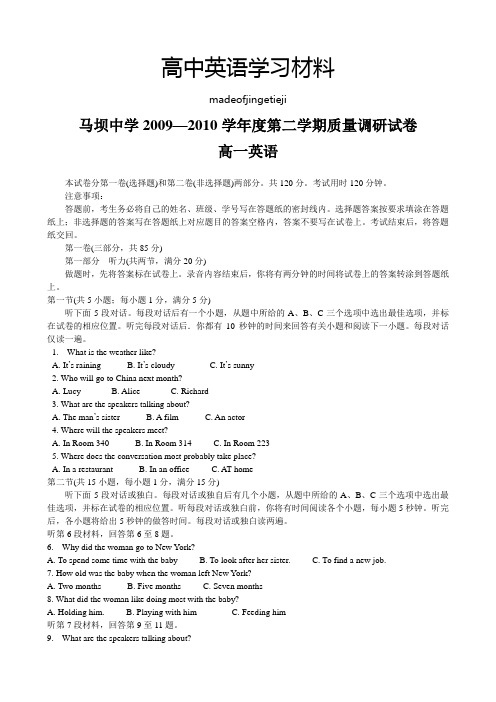
高中英语学习材料madeofjingetieji马坝中学2009—2010学年度第二学期质量调研试卷高一英语本试卷分第一卷(选择题)和第二卷(非选择题)两部分。
共120分。
考试用时120分钟。
注意事项:答题前,考生务必将自己的姓名、班级、学号写在答题纸的密封线内。
选择题答案按要求填涂在答题纸上;非选择题的答案写在答题纸上对应题目的答案空格内,答案不要写在试卷上。
考试结束后,将答题纸交回。
第一卷(三部分,共85分)第一部分听力(共两节,满分20分)做题时,先将答案标在试卷上。
录音内容结束后,你将有两分钟的时间将试卷上的答案转涂到答题纸上。
第一节(共5小题;每小题1分,满分5分)听下面5段对话。
每段对话后有一个小题,从题中所给的A、B、C三个选项中选出最佳选项,并标在试卷的相应位置。
听完每段对话后.你都有10秒钟的时间来回答有关小题和阅读下一小题。
每段对话仅读一遍。
1.What is the weather like?A. It’s rainingB. It’s cloudyC. It’s sunny2. Who will go to China next month?A. LucyB. AliceC. Richard3. What are the speakers talking about?A. The man’s sisterB. A filmC. An actor4. Where will the speakers meet?A. In Room 340B. In Room 314C. In Room 2235. Where does the conversation most probably take place?A. In a restaurantB. In an officeC. AT home第二节(共15小题,每小题1分,满分15分)听下面5段对话或独白。
每段对话或独自后有几个小题,从题中所给的A、B、C三个选项中选出最佳选项,并标在试卷的相应位置。
牛津译林版高中英语必修二高一下学期期末考试英语Word版含答案
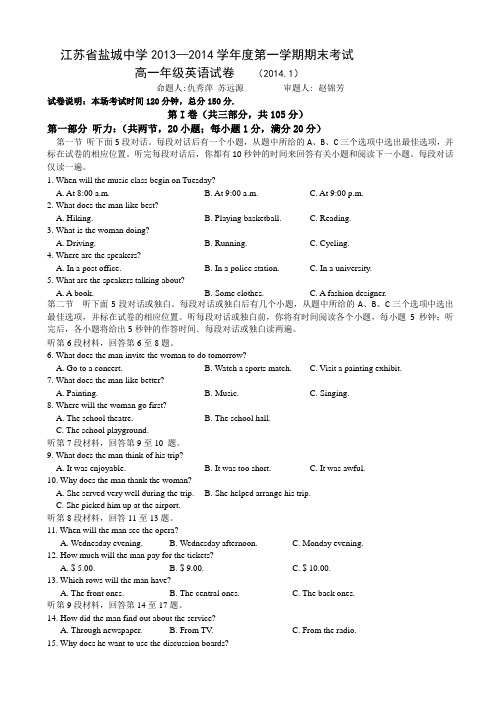
江苏省盐城中学2013—2014学年度第一学期期末考试高一年级英语试卷(2014.1)命题人:仇秀萍苏远源审题人: 赵锦芳试卷说明:本场考试时间120分钟,总分150分.第I卷(共三部分,共105分)第一部分听力:(共两节,20小题;每小题1分,满分20分)第一节听下面5段对话。
每段对话后有一个小题,从题中所给的A、B、C三个选项中选出最佳选项,并标在试卷的相应位置。
听完每段对话后,你都有10秒钟的时间来回答有关小题和阅读下一小题。
每段对话仅读一遍。
1. When will the music class begin on Tuesday?A. At 8:00 a.m.B. At 9:00 a.m.C. At 9:00 p.m.2. What does the man like best?A. Hiking.B. Playing basketball.C. Reading.3. What is the woman doing?A. Driving.B. Running.C. Cycling.4. Where are the speakers?A. In a post office.B. In a police station.C. In a university.5. What are the speakers talking about?A. A book.B. Some clothes.C. A fashion designer.第二节听下面5段对话或独白。
每段对话或独白后有几个小题,从题中所给的A、B、C三个选项中选出最佳选项,并标在试卷的相应位置。
听每段对话或独白前,你将有时间阅读各个小题,每小题5秒钟;听完后,各小题将给出5秒钟的作答时间.每段对话或独白读两遍。
听第6段材料,回答第6至8题。
6. What does the man invite the woman to do tomorrow?A. Go to a concert.B. Watch a sports match.C. Visit a painting exhibit.7. What does the man like better?A. Painting.B. Music.C. Singing.8. Where will the woman go first?A. The school theatre.B. The school hall.C. The school playground.听第7段材料,回答第9至10 题。
译林版高一英语下册期末试卷(含答案)
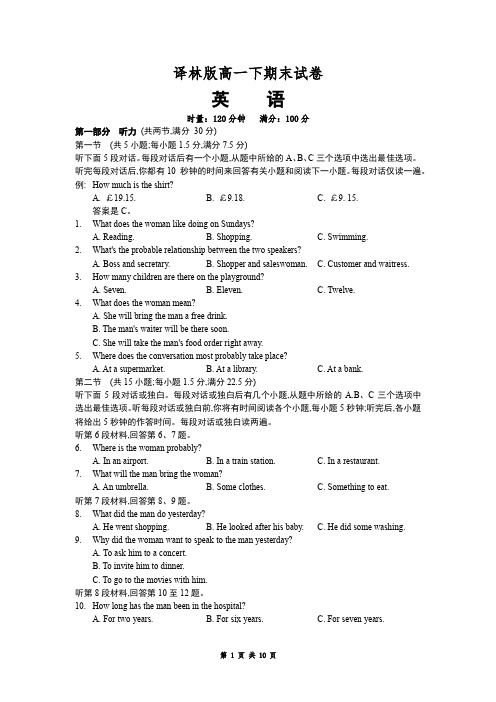
译林版高一下期末试卷英语时量:120分钟满分:100分第一部分听力(共两节,满分30分)第一节(共5小题;每小题1.5分,满分7.5分)听下面5段对话。
每段对话后有一个小题,从题中所给的A、B、C三个选项中选出最佳选项。
听完每段对话后,你都有10 秒钟的时间来回答有关小题和阅读下一小题。
每段对话仅读一遍。
例: How much is the shirt?A. £19.15.B. £9.18.C. £9. 15.答案是C。
1. What does the woman like doing on Sundays?A. Reading.B. Shopping.C. Swimming.2. What's the probable relationship between the two speakers?A. Boss and secretary.B. Shopper and saleswoman.C. Customer and waitress.3. How many children are there on the playground?A. Seven.B. Eleven.C. Twelve.4. What does the woman mean?A. She will bring the man a free drink.B. The man's waiter will be there soon.C. She will take the man's food order right away.5. Where does the conversation most probably take place?A. At a supermarket.B. At a library.C. At a bank.第二节(共15小题;每小题1.5分,满分22.5分)听下面5段对话或独白。
牛津译林版高一英语下学期期末试卷
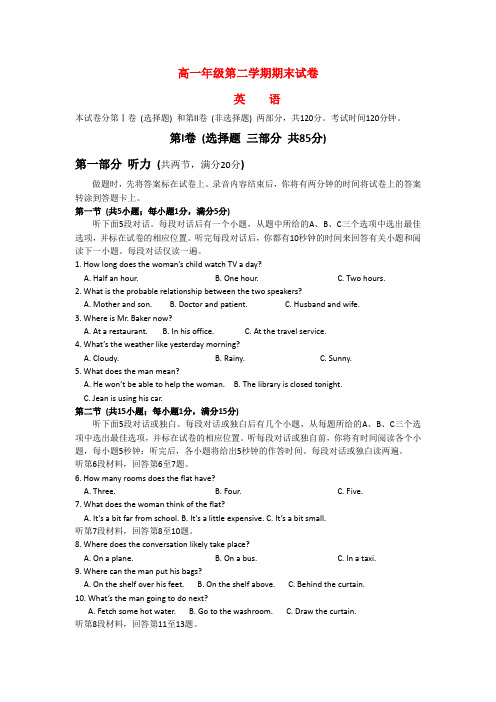
高一年级第二学期期末试卷英语本试卷分第Ⅰ卷(选择题) 和第II卷(非选择题) 两部分,共120分。
考试时间120分钟。
第I卷(选择题三部分共85分)第一部分听力(共两节,满分20分)做题时,先将答案标在试卷上。
录音内容结束后,你将有两分钟的时间将试卷上的答案转涂到答题卡上。
第一节(共5小题;每小题1分,满分5分)听下面5段对话。
每段对话后有一个小题,从题中所给的A、B、C三个选项中选出最佳选项,并标在试卷的相应位置。
听完每段对话后,你都有10秒钟的时间来回答有关小题和阅读下一小题。
每段对话仅读一遍。
1. How long does the woman’s child watch TV a day?A. Half an hour.B. One hour.C. Two hours.2. What is the probable relationship between the two speakers?A. Mother and son.B. Doctor and patient.C. Husband and wife.3. Where is Mr. Baker now?A. At a restaurant.B. In his office.C. At the travel service.4. What’s the weather like yesterday morning?A. Cloudy.B. Rainy.C. Sunny.5. What does the man mean?A. He won’t be able to help the wom an.B. The library is closed tonight.C. Jean is using his car.第二节(共15小题;每小题1分,满分15分)听下面5段对话或独白。
每段对话或独白后有几个小题,从每题所给的A、B、C三个选项中选出最佳选项,并标在试卷的相应位置。
高一英语下学期期末测试卷02(牛津译林2020)(A4考试版)
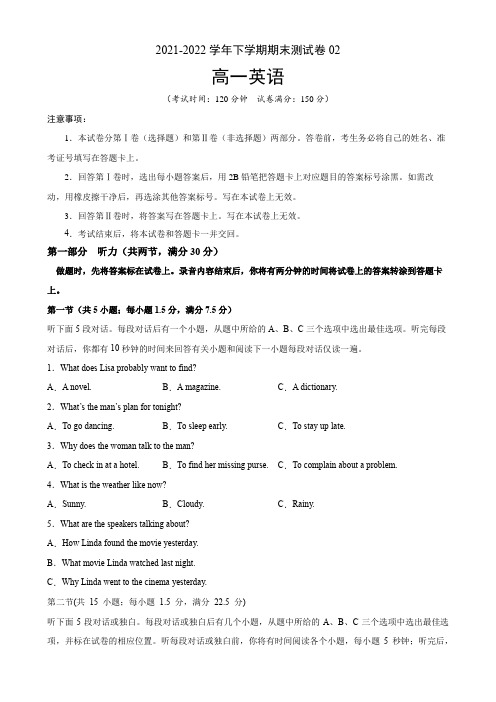
2021-2022学年下学期期末测试卷02高一英语(考试时间:120分钟试卷满分:150分)注意事项:1.本试卷分第Ⅰ卷(选择题)和第Ⅱ卷(非选择题)两部分。
答卷前,考生务必将自己的姓名、准考证号填写在答题卡上。
2.回答第Ⅰ卷时,选出每小题答案后,用2B铅笔把答题卡上对应题目的答案标号涂黑。
如需改动,用橡皮擦干净后,再选涂其他答案标号。
写在本试卷上无效。
3.回答第Ⅱ卷时,将答案写在答题卡上。
写在本试卷上无效。
4.考试结束后,将本试卷和答题卡一并交回。
第一部分听力(共两节,满分30分)做题时,先将答案标在试卷上。
录音内容结束后,你将有两分钟的时间将试卷上的答案转涂到答题卡上。
第一节(共5小题;每小题1.5分,满分7.5分)听下面5段对话。
每段对话后有一个小题,从题中所给的A、B、C三个选项中选出最佳选项。
听完每段对话后,你都有10秒钟的时间来回答有关小题和阅读下一小题每段对话仅读一遍。
1.What does Lisa probably want to find?A.A novel.B.A magazine.C.A dictionary.2.What’s the man’s plan for tonight?A.To go dancing.B.To sleep early.C.To stay up late.3.Why does the woman talk to the man?A.To check in at a hotel.B.To find her missing purse.C.To complain about a problem.4.What is the weather like now?A.Sunny.B.Cloudy.C.Rainy.5.What are the speakers talking about?A.How Linda found the movie yesterday.B.What movie Linda watched last night.C.Why Linda went to the cinema yesterday.第二节(共15 小题;每小题 1.5 分,满分22.5 分)听下面5段对话或独白。
牛津译林版英语高一下册期末测试Ⅱ
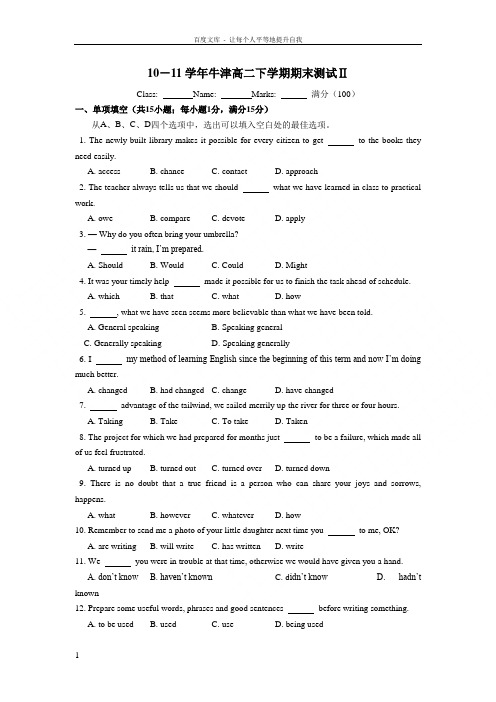
10-11学年牛津高二下学期期末测试ⅡClass: Name: Marks: 满分(100)一、单项填空(共15小题;每小题1分,满分15分)从A、B、C、D四个选项中,选出可以填入空白处的最佳选项。
1. The newly-built library makes it possible for every citizen to get to the books they need easily.A. accessB. chanceC. contactD. approach2. The teacher always tells us that we should what we have learned in class to practical work.A. oweB. compareC. devoteD. apply3. — Why do you often bring your umbrella?—it rain, I’m prepared.A. ShouldB. WouldC. CouldD. Might4. It was your timely help made it possible for us to finish the task ahead of schedule.A. whichB. thatC. whatD. how5. , what we have seen seems more believable than what we have been told.A. General speakingB. Speaking generalC. Generally speakingD. Speaking generally6. I my method of learning English since the beginning of this term and now I’m doing much better.A. changedB. had changedC. changeD. have changed7. advantage of the tailwind, we sailed merrily up the river for three or four hours.A. TakingB. TakeC. To takeD. Taken8. The project for which we had prepared for months just to be a failure, which made all of us feel frustrated.A. turned upB. turned outC. turned overD. turned down9. There is no doubt that a true friend is a person who can share your joys and sorrows, happens.A. whatB. howeverC. whateverD. how10. Remember to send me a photo of your little daughter next time you to me, OK?A. are writingB. will writeC. has writtenD. write11. We you were in trouble at that time, otherwise we would have given you a hand.A. don’t knowB. haven’t knownC. d idn’t knowD. hadn’t known12. Prepare some useful words, phrases and good sentences before writing something.A. to be usedB. usedC. useD. being used13. —Roll the picture up so that it won’t get .—OK. I’ll do it right now.A. damagingB. damagedC. to be damagedD. being damaged14. Only towards the end of the party , explaining that he had been caught in a traffic jam on the way.A. came TomB. Tom did comeC. Tom cameD. did Tom come15. —I’m going downtown.—I’ll give you a lift.A. Why not?B. Come on.C. Up to you.D. Cheer up!二、完形填空(共20小题;每小题1分,满分20分)A long time ago, there lived a fox in the forest. The fox thought of nothing but 16 and saw everything as a possible source of feasting. One day, the fox heard the sound of a drum. Since he had 17 heard a drum before, he had no idea what it was and 18 the sound. It led him to a field where a drummer was practising. After a while he was tired and went off to 19 . The fox looked at the drum 20 . Since it made a sound, the fox was quite sure that it was a 21 creature. His mouth watered as he looked at its round shape and 22 all the goodies inside it.“How big and soft it looks!” he said. “I’m sure it must 23 lovely! If only I could eat i t!” But he was afraid of being 24 and did not dare to touch it at first. But when the drum remained 25 , the fox decided to attack it.The fox jumped on the drum and tried to 26 it. The drum was very tough and he could make no headway (进展) at first. He bit harder and harder and did not 27 even when some of his teeth broke in the 28 . Finally he managed to break through it and made a 29 .“Wow! It must be full of tasty meat. I can 30 myself for days!” He criedforgetting his 31 m outh. He thought, “How lucky I am to 32 this creature!”When he finally put his 33 inside, he found nothing but a piece of wood, quite unfit for 34 ! And he had lost all his front teeth!“If only I didn’t 35 it for food!” he told himself sad ly. But it was too late!16. A. dreaming B. sleeping C. play D. food17. A. then B. just C. never D. soon18. A. made B. followed C. recorded D. repeated19. A. rest B. hide C. learn D. work20. A. angrily B. gratefully C. curiously D. proudly21. A. dangerous B. familiar C. popular D. live22. A. enjoyed B. imagined C. kept D. showed23. A. taste B. sound C. feel D. smell24. A. attacked B. blamed C. disturbed D. refused25. A. noisy B. nervous C. happy D. still26. A. hold B. beat C. bite D. push27. A. understand B. stop C. stand D. escape28. A. attempt B. experiment C. place D. adjustment29. A. fall B. cry C. hole D. picture30. A. lose B. feed C. excuse D. adapt31. A. bleeding B. moving C. opening D. shaking32. A. buy B. carry C. invent D. find33. A. tail B. tool C. foot D. mouth34. A. touching B. sending C. eating D. repairing35. A. pay B. mistake C. change D. serve三、阅读理解(共15小题;每小题2分,满分30分)阅读下面短文,从短文后各题所给的四个选项(A、B、C和D)中,选出最佳选项。
2020-2021学年高一英语下学期期末测试卷(牛津译林版2020)(新高考)02原卷版

高一英语第二学期期末模拟试卷2(译林新教材)说明:本卷不含听力,满分120分,适用采用译林版新教材参加新高考地区的学生。
第一部分阅读理解(共两节, 满分50分)第一节(共15小题;每小题2.5分, 满分37.5分)阅读下列短文,从每题所给的A、B、C和D四个选项中,选出最佳选项。
ABelow are the international days currently playing a more and more important role across the world.World Earth DayEvery year on April 22, People all over the world celebrate Earth Day. It is a time to work to keep our earth clean. U.S. Senator (参议员) Gaylord Nelson first thought of the idea for Earth Day in 1962 when he saw polluted rivers and cities with smoke. He needed to get support from Americans to clean up the earth. Finally, on April 22, 1970, 20 million Americans celebrated the first Earth Day! It is a day that is meant to raise awareness (意识) and appreciation about the Earth’s natural environment.World Book DayWorld Book Day is a celebration to improve the enjoyment of books and reading. Each year, on April 23, celebrations take place all over the world. April 23 marks the anniversary (周年纪念日) of the birth or death of a number of well-known writers, including William Shakespeare, Miguel de Cervantes and Manuel Mejía Vallejo. World Book Day is an occasion to pay a worldwide respect to books and authors and to encourage people to discover the pleasure of reading.World Autism Awareness Day (世界自闭症关注日)Wo rld Autism Awareness Day aims to increase people’s awareness about people, especially children, with autism. This condition affects the brain’s functions and remains with a person for his or her whole life. The first signs usually appear before a child is three years old. On December 18, 2007, the UN General Assembly (联合国大会) determined April 2 as World Autism Awareness Day. It was first observed in 2008.1.What made Gaylord come up with the idea for Earth Day at first?A. Polluted water and cities with smoke.B. Support from Americans.C. Serving as a Senator.D. The Earth’s natural environment.2.Why is April 23 the day of World Book Day?A. To help children with autism.B. To discover the pleasure of reading.C. To honor some well-known writers.D. To sell more books.3.What do the Days have in common?A. The Days raise the awareness of protecting the earth.B. The Days took place in the same month.C. The Days are only celebrated in America.D. The Days were all first celebrated in 2008.BWhen 45-year-old Randy Pausch was diagnosed with pancreatic (胰腺)cancer, he chose to focus on living rather than dying. As a computer science professor at Carnegie Mellon University, Pausch was asked to deliver a "last lecture”. This well-known campus tradition allowed professors to share worldly wisdom with students as if they were dying and had one last lecture to give.The only difference in Pausch's case is that Pausch really was dying, but it only motivated him more. He delivered his last lecture, "Really Achieving Your Chi ldhood Dreams” on Sept. 18, 2007.Pausch began by sharing several of his boyhood dreams, some of which he had achieved and the others he hadn't. He described the importance of having dreams and how anyone can still learn a lot by reaching for those dreams, even if they don't always succeed He shared the values learned through experience, which he hoped to pass on to others hard work, laughter and gratitude.honesty , character ,Pausch's last lecture received a great deal of praise and attention. It became a crazy YouTube hit, and in October 2007, he presented an abridged (删节的)version on “The Oprah Winfrey Show". He turned the lecture into a book by the same name, which quickly became a best-seller. Readers were deeply moved by the book's representation of Pausch's lifelong philosophy and the way it revealed the biggest source of his motivation—his three young children.Pausch passed away on July 25, 2008, but his voice lives on in the recorded lecture and his book He continues to motivate us all by encouraging us to never give up our childhood dreams—a source of inspiration that can neverrun dry.4.Why was Pausch asked to give his "last lecture ?A. To teach the students.B. To make him have a better heC. To cure his cancer.D. To achieve his dream.5.What was Pausch's lecture mainly about?A. His private life in boyhood.B. Having dreams and good values.C. The reason for his success.D. The experience learned from others.6.Which of the following motivated Pausch most?A. His dreams.B. His children.C. His work.D. His students.7.What can be the best title for the text?A. Keep on DreamingB. The Meaning of LifeC. Motivation from LifeD. Give the Last LectureCBelieve it or not, nearly a fifth of older adults have contact with friends, family and neighbors less than once a week. In the United Kingdom, that amounts to nearly 9 million residents who are isolated with little social contact. In the United States, a 2019 survey on aging found 8% of older adults living alone who report feelings of loneliness.In Somerset, England, the local police found a way to fight social isolation. Local police chose a project that was local, where they could see the change they’d enabled. Their “chat benches” appeared in local parks, where they encourage strollers(散步者) to sit down and have a chat with a random stranger.“The sign simply helps to break down the invisible, social barriers that exists between strangers who find themselves sharing a common place. We can all play a part…” according to a spokesman for the police dep artment. “Simply stopping to say ‘hello’ to someone at the chat bench could make a huge difference to the vulnerable(易受伤害的) people in our communities and help to make life a little better for them.”Some Texans in the United States, are trying to relieve the loneliness and isolation that many elderly Americans are feeling during the coronavirus pandemic(冠状病毒流行)by creating safe “hugging booths.”Amber Crenshaw and her husband Steve Crenshaw own a business called Handle With Care and work with Unlimited Care Cottages, an assisted living facility. Amber said she and her husband designed and built the hugging booths after one of the nurses suggested the idea."The residents have been, just so filled with joy,” Amber said. “It was one of our resident’s birthdays. We were able to set the booth up for their birthday, and family members were able to come in and give birthday hugs. It has really lifted the spirits of the assisted living residents.”The Crenshaws have just worked with Unlimited Care so far, but they said other assisted living facilities in Texas have contacted them with interest.8.What is the finding of the 2019 investigation?A. A majority of old people get in touch with others less than once a week.B. The number of isolated people who contact with others adds up to 9 million in the UK.C. 8% of the aged people who suffer from loneliness live on their own in America.D. There are more people who have little connection with others in the UK than in the USA.9.Why did the local police in Somerset set up “chat benches” in local parks?A. To remind older adults of the tricks of the cheats.B. To better the public facilities in the community.C. To make local people feel closer to each other.D. To celebrate United Nations World Elder Day.10.What can be inferred from the case of “hugging booths”?A. Hugging booths play a role in birthday hugs in family membersB. The Crenshaws run a business and an assisted living facilityC. Some nurses first came up with the idea of the “hugging booth”.D. There’re many assi sted living facilities with hugging booths.11.What’s the purpose of this text?A. To raise people’s awareness of caring lonely seniors.B. To help protect the people living in the community.C. To urge family members to hug each other more often.D. To present the differences between the two methods.DA study of 100 mobile apps for kids found that 72 broke a law aimed at protecting children's online privacy. Researchers developed a tool that can determine whether a mobile app follows the Children's Online Privacy Protection Act(COPPA). The tool was 99%right. Researchers continue to improve the technology, which they plan to make available for download at no cost.When you download an app, it can get a lot of information on your cellphone. You have to keep in mind that all this information can be collected by these apps and sent to third parties. What do they do with it? They can pretty much do anything. We should be careful about this. Apps can get personal identifiable information, including names, email addresses, phone numbers, locations, audio and visual recordings, and unique identifiers or devices such as an international mobile equipment identity(IMEI), media access control(MAC) addresses, Android IDs and Android advertising IDs. The advertising ID, for example, allows app developers to collect information on user’s interests, which they can then sell to advertisers. What's worse, games and other apps that violate COPPA cause privacy risks that could make it possible for someone to determine a child's ID and location. A bad man could probably get the user's email ID and geographic location and try to kidnap the child.COPPA requires that websites and online services directed to children get parental agreement before collecting, personal information from anyone younger than 13; however, as the research found, many popular apps do not follow the rule. Researchers found that many popular games designed specifically for young children showed users’. Android IDs, Android advertising IDs and device descriptions. Researchers suggest that parents should be careful when downloading or allowing children to download apps. They advise keeping downloads to a minimum. Don't download apps unless they need to.12.What is the matter with most mobile apps for kids?A. They lead children to do wrong.B. They are too expensive for kids.C. They collect children's private information.D. They are too difficult to operate.13.What can we learn about the testing tool?A. It will be put online for sale.B. Parents will get it for free.C. Apps will find ways to deal with it.D. Researchers will give it up after the study.14.What will apps do with kids' privacy?A. They will send it to others.B. They will publish it online.C. They will keep it a secret.D. They will use it in social surveys.15.What is the researchers' advice to parents about downloading apps?A. Downloading as few apps as possible.B. Downloading as many apps as required.C. Downloading no apps from the Internet.D. Downloading apps that COPPA identifies.第二节(共5小题:每小题2. 5分, 满分12. 5分)阅读下面短文, 从短文后的选项中选出可以填入空白处的最佳选项。
牛津译林版高中英语必修二下学期期末考试高一英语试题
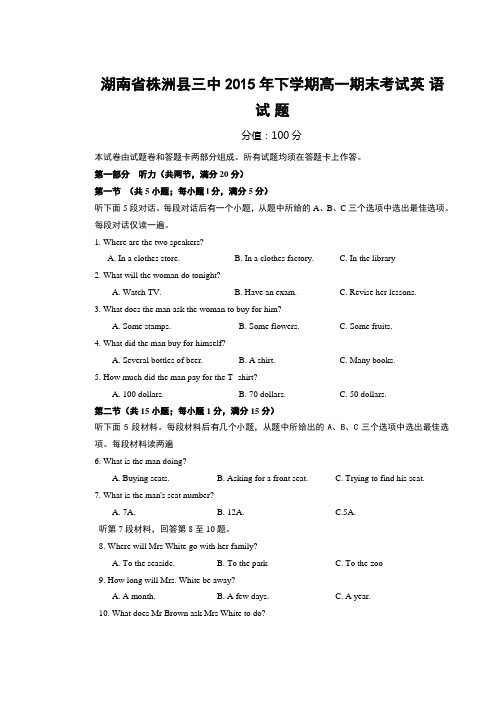
湖南省株洲县三中2015年下学期高一期末考试英语试题分值:100分本试卷由试题卷和答题卡两部分组成。
所有试题均须在答题卡上作答。
第一部分听力(共两节,满分20分)第一节(共5小题;每小题l分,满分5分)听下面5段对话。
每段对话后有一个小题,从题中所给的A、B、C三个选项中选出最佳选项。
每段对话仅读一遍。
1. Where are the two speakers?A. In a clothes store.B. In a clothes factory.C. In the library2. What will the woman do tonight?A. Watch TV.B. Have an exam.C. Revise her lessons.3. What does the man ask the woman to buy for him?A. Some stamps.B. Some flowers.C. Some fruits.4. What did the man buy for himself?A. Several bottles of beer.B. A shirt.C. Many books.5. How much did the man pay for the T- shirt?A. 100 dollars.B. 70 dollars.C. 50 dollars.第二节(共15小题;每小题1分,满分15分)听下面5段材料。
每段材料后有几个小题,从题中所给出的A、B、C三个选项中选出最佳选项。
每段材料读两遍6. What is the man doing?A. Buying seats.B. Asking for a front seat.C. Trying to find his seat.7. What is the man's seat number?A. 7A.B. 12A.C.5A.听第7段材料,回答第8至10题。
- 1、下载文档前请自行甄别文档内容的完整性,平台不提供额外的编辑、内容补充、找答案等附加服务。
- 2、"仅部分预览"的文档,不可在线预览部分如存在完整性等问题,可反馈申请退款(可完整预览的文档不适用该条件!)。
- 3、如文档侵犯您的权益,请联系客服反馈,我们会尽快为您处理(人工客服工作时间:9:00-18:30)。
高一下学期期末考试英语试题一、听力第一节(共5小题)听下面5段对话。
每段对话后有一个小题,从题中所给的A、B、C三个选项中选出最佳选项,并标在试卷的相应位置。
听完每段对话后,你都有10秒钟的时间来回答有关小题和阅读下一小题。
每段对话仅读一遍。
1. Who is the man talking about now?A. His girlfriend.B. His sister.C. His mother.2. What are they talking about?A. A traffic accident.B. A fire.C. A crime.3. Where does the conversation most probably take place?A. At a bookshop.B. At a kitchen.C. At a bank.4. Who was injured?A. George.B. George's wife.C. George's wife's father.5. What do we learn from the conversation?A. Tony could not continue the experiment.B. Tony finished the experiment last night.C. Tony will go on with his experiment.第二节(共15小题)听下面5段对话或独白。
每段对话或独白后有几个小题,从题中所给的A、B、C三个选项中选出最佳选项,并标在试卷的相应位置。
听每段对话或独白前,你将有时间阅读各个小题,每小题5秒钟;听完后,各小题将给出5秒钟的作答时间。
每段对话或独白读两遍。
听第6段材料,回答第6至7题。
6. Where does this conversation most likely take place?A. In the street.B. At the woman's home.C. Over the phone.7. What is the woman going to do tonight?A. Help her sister with English.B. Meet her friend at the station.C. Go to an exhibition with her parents.听第7段材料,回答第8至10题。
8. When will the football competition end?A. On August 17.B. On August 20.C. On August 25.9. What do we know about the two speakers?A. They will both enter the competition.B. They both work hard at their lessons.C. They both enjoy swimming.10. Where will the football competition be held?A. In the city's stadium.B. In the speakers' school.C. In the park.听第8段材料,回答第11至13题。
11. What probably is the woman?A. A driver.B. A teacher.C. A reporter.12. How long does it take the man to get to school by bike?A. About an hour.B. Half an hour.C. Fifteen minutes.13. What does the man think of the traffic in the city?A. Excellent.B. Terrible.C. Normal.听第9段材料,回答第14至17题。
14. How does the woman feel at the beginning of the conversation?A. Angry.B. Surprised.C. Sad.15. What size bag does the woman want?bag.16. When will the woman leave for Mexico?A. On Thursday.B. On Friday.C. On Saturday.17. Where does the man work?A. At a mail order company.B. At an international travel service.C. At the airport information desk.听第10段材料,回答第18至20题。
18. Why did the man decide to leave the college in his second term?A. He didn't like the big lecture classes.B. He couldn't afford further education.C. He was not interested in education.19. What does he think of his work experiences?A. They were personally rewarding.B. They should be part of school life.C. They gave him a chance to learn German.20. Where is the university he decides to go to in the end?A. In South Carolina.B. In Florida.C. In Ohio.二、单项选择1.Not only _____ a writer but he was an artist for a time.A. he isB. he wasC. is heD. was he2.Dimitri likes to sleep ___ his side.A. inB. onC. ontoD. with3.A plan has been put forward_______more graduates should go to work in the countryA. whenB. thatC. whetherD. how4.Each of the 400 people received from their boss____ gift——“Who moved my cheese?”——____ best-seller in the US——to understand how to deal with changes in their lives and work.A、the; 不填B、a;aC、a;不填D、the;a5.—Hey, dear! Guess what? I’ve got a pay rise!—This ________ a celebration! Let’s go to sing karaoke tonight.A.calls for B.works out C.brings about D.pays for6. he thought he was helping us with the work, he was actually in the way.A.Although B.Unless C.Because D.When7.—Lend me some more money,will you?—Sorry,I’ve got______at hand myself.You know the MP3 player cost me all I had just now.A.nothingB.noC.noneD.not8.The law ,which was passed for the benefit of public ,forbade people to smoke in public places .A . / ;theB .the ; theC .the . /D ./ ; /9.It was lucky that little Jack was not at home when the fire broke out;otherwise,he his life.A.had lost B.would lose C.would have lost D.might lose 10.Yesterday a street beggar bought a lottery ticket purposelessly,__________him a millionaire overnight.A.makingB.makesC.to make11. Do you still remember the chicken farm _______ we visited last year?A. whereB. whenC. thatD. what12.I don’t mind picking up your things from the store. _____, the walk will do me good.A. Sooner or laterB. StillC. BesidesD. In time 13.--- Thank you ever so much for your timely help?--- ____________ .A. Glad to hear that.B. With pleasure.C. Thank nothing of it.D. All right.14.that they may eventually reduce the amount of labor needed on construction sites by 90 per-cent.A.Such construction robots are cleverB.So clever the construction robots areC.So clever are the construction robotsD.Such clever construction robots are15.Exciting as its special effects are ______, there is too much violence in the film.A. being watchedB. to be watchedC. watchingD. to watch三、完型填空When I was a boy, every holiday that I had seemed wonderful. My parents took me by train or by car to a hotel by the 1 . All day, I seem to remember, I played on the sands with strange 2 children. We made houses and gardens, and 3 the tide destroy them. When the tide went out, we climbed over the rocks and looked down at the fish in the rock-pools.In those days the sun seemed to shine always 4 and the water was always warm. Sometimes we left beach and walked in the country, 5 ruined houses and dark woods and climbing trees. There were sweets in one’s pockets or good places where one could 6 ice creams. Each day seemed a life-time.7 I am now thirty-five years old, my idea of a good holiday is much the same as it was. I 8 like the sun and warm sand and the sound of 9 beating (拍打) the rocks. I no longer wish to 10 any sand house or sand garden, and I dislike sweets. 11 , I still love the sea and often feel sand running through my fingers.Sometimes I 12 what my ideal(理想的) holiday will be like when I am old . 13 I want to do then, perhaps, will be to lie in bed, reading books about 14 who make houses and gardens with sands, who watch the incoming tide, who make themselves 15 on too many ices creams.1. A. sea B. lake C. mountain D.river2. A. moved B. excited C. anxious D. nervous3. A. made B. brought C. watched D. heard4. A. gently B. hardly C. brightly D. carefullyA.in need ofB. in search ofC. in place ofD. in praise of5. A. sell B. make C. buy D. offer6. A. When B. Although C. If D. But7. A.almost B. perhaps C. still D. often8. A.waves B. wind C. hands D. feet9. A.destroy B. fix C. use D. build10.A. But B. However C. Otherwise D. Besides11.A.wonder B. feel C. understand D. believe12.A. All B. Each C. Both D. Every13.A. girls B. boys C. children D. grown-ups14.A. happy B. tired C. sad D. sick四、阅读理解AThe impression you make at the beginning of an interview is very important. Employers often decide to hire someone in the first three minutes of the interview. They judge you by your appearance, attitude (态度) and manners.A friendly smile when you walk into the room is important. A smile shows a confident (自信的) and positive attitude.When you introduce yourself, make eyes contact with the interviewer. Some interviewers offer a hand shake. Others don’t.Try to be as natural as possible. But pay attention to your body language. The way you sit, walk, gesture, use your voice and show feeling on your face are all parts of your body language. It makes the interviewer know how you feel about yourself and the situation you are in. Are you feeling positive about yourself? Your abilities? Your interest in the job?Speak clearly and loudly enough. Show interest and enthusiasm in your voice. Wh en you speak, look at the interviewer. Also don’t say negative things about yourself, or former employers.Listen to questions carefully. If you don’t understand a question, ask the interviewer to repeat or explain.1. It can be inferred from the passage that ________.A. you should always put on a smile when meeting the employerB. you should stand still with respect before the employerC. the first impression is very important in an interviewD. employers understand and like employees’ nervousness2. Why should we pay attention to our body language?A. Because it can help us win the employer’s positive impression.B. Because it can help us feel about the employer.C. Because it is needed by our employer.D. Because we need it to improve our feeling.3. The main purpose of the passage is ________.A. to give you some advice on the art of finding a jobB. to tell from wrong about job interviewsC. to explain why we should do something about an interviewD. to suggest not being shy in an interview4. Which of the following can be the best title for the passage?A. A Friendly Smilew。
